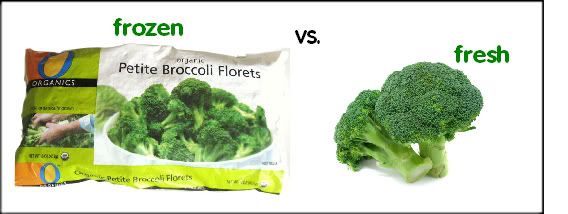
After one of my Easy Everyday Cooking Classes, one participant wrote an alarmed message on her evaluation form: “Why did you use frozen vegetables for the Cauliflower Tomato Curry? I never eat anything but fresh!”
My bad. Not for using frozen veggies, but for failing to clarify the reasoning. While the word is getting out about frozen vegetables, let me repeat the key points in case you’ve missed anything:
1. Fresh vegetables are better, if they’re really fresh, When nutrition experts rhapsodize over fresh vegetables, the vegetables they have in mind are those picked that morning then stored properly until dinner time. Sadly, however, the “fresh” vegetables in your grocery store aren’t generally far from this kind of fresh. Even though they look fresh, they may well be two, three or four days old, depending upon how long it took to transport them from the field (often in a distant part of the country), through warehouses and distribution points and onto your store’s shelves, where they may sit for another day or two before being purchased. Then they may sit another day (or week) in your frig before making it onto the dinner plate.
2. Vegetables begin the slow slide into compost the minute they are picked. And they begin to deteriorate nutritionally as well as physically. While proper storage can minimize nutrient loss, consumers are often lax in this regard. Produce isn’t bagged properly, it sits in hot cars too long, is forgotten about on counters and is denied the optimal humidity in the frig.
3. Meanwhile, produce destined for the freezer case is flash frozen shortly after picking, at its nutritional peak. That nutritional high point can then be maintained for six months at least.
4. So while the translation from fresh to frozen undoubtedly results in nutrient loss, it’s surely no worse than that suffered by “fresh” produce that has survived three (or maybe 13) days in trucks, warehouses, grocery shelf bins and crisper drawers. And nutritional studies have confirmed this fact.
Despite the evidence, it not uncommon to still feel uneasy about using frozen vegetables. For so long, the “eat plenty of fresh fruits and vegetables” prescription has been drilled into us to the point where, at a visceral level, it just feels wrong to eat frozen veggies. And let’s not forget about taste. Without a doubt, fresh vegetables (even if a few days old), generally taste a whole lot better than frozen.
On the other hand, frozen veggies have a lot to offer over fresh:
- They won’t rot in the crisper if you forget them for a week, buy too many veggies or experience schedule changes that make mincemeat of your dinner plans.
- They are enormously convenient: No peeling, paring, dicing or slicing. Just cut open the bag and dump into a pan.
- They are reasonably priced, especially considering that there is not wastage.
- While their taste is not as good as fresh, the last few years have seen a huge improvement in the quality of frozen vegetables.
My bottom line: I view frozen veggies not as a straight substitution for fresh veggies, but as a convenient alternative. In other words, where taste is critical, I stick with fresh (and strive my best to use really fresh vegetables.) However, where convenience and speed are the more critical drivers, I have no problem drawing on my freezer pantry for veggies. As an example, I don’t microwave frozen broccoli for a free-standing vegetable to serve alongside chicken parmesan. But in my quest to get more vegetables into my life, I don’t hesitate to add frozen broccoli into a scramble so I can enjoy a vegetable-rich breakfast in a hurry.
I also don’t hesitate to use frozen veggies when suffering from a case of “vegetable exhaustion,” as advised in yesterday’s post. Today’s recipe for Creamy Ginger Peas and White Fish is a perfect example of using frozen to give myself a rest in the kitchen while still enjoying a vegetable-rich meal. See the next post with “5 Quick Vegetable Boosts with Frozen Veggies,” and “10 Top Frozen Vegetables to Stock in Your Freezer Pantry.”
1 thought on “Frozen Veggies Can Be As (or More) Nutritious Than Fresh”